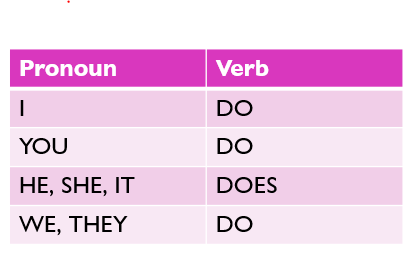Does Need Quick - Getting Your Verbs Right
Have you ever paused mid-sentence, wondering whether to say "do" or "does"? It happens to a lot of people, really. These two little words, so common in everyday conversation and writing, often cause a moment of hesitation. They both come from the same verb, "to do," yet picking the right one seems to depend on who or what you are talking about.
It's a pretty common puzzle, actually. Figuring out which form fits can feel like a small challenge, but it is one that makes a real difference in how clear your message comes across. We're going to look at this closely, giving you a way to sort it out without too much fuss. You might find it's simpler than you thought, in some respects, to get these two straight.
This piece aims to clear up that small bit of confusion. We'll show you exactly when to use "do" and when "does" is the right fit. By the end, you will have a much better handle on these two, and your sentences will flow more naturally, which is pretty good, you know, for anyone trying to communicate clearly.
- Jack Wagner Bold And Beautiful Return
- Dead Rising Characters
- Josh Allen Janitor
- Christina Ricci As Wednesday Addams
- Sonic Drinks Secret Menu
Table of Contents
- When does it make sense to use 'do'?
- What makes 'do' the quick choice?
- How to tell if your sentence needs 'does'?
- When does a single person or thing use 'does'?
- Getting Clear on 'Do' and 'Does'
- The Basic Difference, Quick to Grasp
- Looking at Examples for 'Do' and 'Does'
- Why Knowing This Quick Rule Helps
When does it make sense to use 'do'?
So, you might be wondering about "do" and when it steps onto the stage. It's really quite straightforward. Think about yourself, or a group of people, or even just talking to someone directly. When your sentence is about "I," "you," "we," or "they," that is when "do" comes into play. It's like a team player for those specific pronouns, you know? For example, if you are talking about what you enjoy, you would say, "I do like a good book." You would not say, "I does like a good book," because that just sounds a bit off, doesn't it? The connection between "I" and "do" is a strong one, pretty much always there, and it helps your sentences sound right.
Consider a situation where you are discussing what a group of friends might be doing. You would say, "They do enjoy spending time together." Or, if you are asking someone about their plans, you might ask, "Do you want to go to the park?" These are all common ways "do" shows up, and it is usually quite natural to use it with these subjects. It just fits, apparently. It's the form that works for multiple people, or for when you are talking about yourself or the person you are speaking with. It's a very flexible word in some respects, but it has its set partners that it prefers to be with, making your sentences sound correct.
When you use "do" in a sentence, it often helps to emphasize something or to ask a question. For instance, if someone doubts your love for pizza, you could
- Kitchenaid 5 Speed Hand Mixer
- Plane Crash Today Texas
- Kentucky Sheriff Shooting Judge Why
- Phone Case For Girlfriend
- Cast Cruel Intentions 2
- Perez Maria
- Stephen Curry With Daughter
- Cast Of Green Lantern 2
- Walking Dead Gabriel
- Karoline Leavitt Feeding Baby

Captcha - WEDOS Global Protection

Sentences with Does, Does in a Sentence in English, Sentences For Does

¿Cual es la diferencia entre do does?